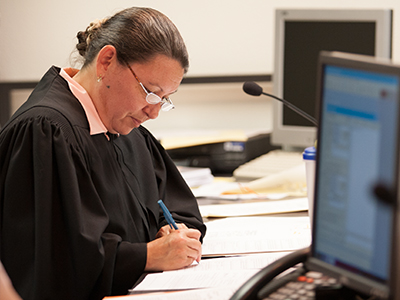justice

The Tulalip Foundation supports justice projects that directly impact the lives of tribal members in need of legal advice and/or representation.
Tulalip Office of Civil Legal Aid
The Tulalip Office of Civil Legal Aid (TOCLA) provides legal assistance to low income members of federally recognized tribes with civil matters at the Tulalip Tribal Court. TOCLA focuses on legal issues that affect Tribal members’ safety, family integrity, health, access to services, and education. These types of cases include consumer law, education, family law, housing, Indian estate planning, public benefits, and Youth in Need of Care advocacy.
Please call the TOCLA intake line at 360-716-4512 for more information.
Grants
- Bureau of Justice Assistance Tribal Civil and Criminal Legal Assistance Program Category 1 (2010): The Tulalip Foundation was awarded a two-year grant of $356,727.00 to create TOCLA and begin to offer civil legal assistance to low-income tribal members.
- Bureau of Justice Assistance Tribal Civil and Criminal Legal Assistance Program Category 1 (2013): The Tulalip Foundation was awarded a one-year grant of $262,943.00 to expand and enhance the services offered by TOCLA.
Healing to Wellness Court
Tulalip’s Healing to Wellness Court will offer comprehensive services in the areas of medical, mental health, and chemical dependency treatment, housing, jobs skills and placement. These services will be provided through an intensely-supervised court program of support and accountability.
Criminal defendants charged with non-violent offenses arising from drug abuse and/or mental health conditions will be eligible to participate in the Healing to Wellness Court and thereby avoid criminal prosecution. An assessment and intake interview will be conducted and an individualized treatment plan developed for each program participant.
Each participant will be supported, supervised, and held accountable to that plan by the members of the Healing to Wellness Court team: judge, prosecutor, defense attorney, coordinator, supervision officer, chemical dependency counselor, law enforcement officer, and community member.
Criminal Conflict Counsel Program
The Criminal Conflict Counsel Program is available to low-income defendants who do not qualify for representation by the University of Washington Tribal Court Public Defense Clinic (TCPDC). Limited staff and conflict screening guidelines under the Washington State Bar Association Rules of Professional Responsibility provoke a need for conflict counsel attorneys. A defendant is asked at his arraignment hearing whether he can afford an attorney or needs one appointed to him. If the TCPDC is unable to represent the defendant, he is offered an attorney from the list maintained by the Criminal Conflict Counsel Program. The Criminal Conflict Counsel Program is only available to low-income individuals who are facing criminal charges in Tulalip Tribal Court, therefore it is not advertised to the general public.
Grants
- Bureau of Justice Assistance Tribal Civil and Criminal Legal Assistance Program Category 2 (2010): The Tulalip Foundation was awarded a two-year grant of $81,400.00 to establish the Criminal Conflict Counsel Program, thereby guaranteeing that a criminal public defense attorney is available as needed.
- Bureau of Justice Assistance Tribal Civil and Criminal Legal Assistance Program Category 2 (2013): The Tulalip Foundation was awarded a one-year grant of $121,779.00 to enhance the program’s capacity to represent indigent tribal members in criminal legal proceedings at the Tulalip Tribal Court.
- Bureau of Justice Assistance Tribal Civil and Criminal Legal Assistance Program Category 2 (2014): The Tulalip Foundation was awarded a one-year supplemental grant of $121,506.00 to enhance the program’s capacity to represent indigent tribal members in criminal legal proceedings at the Tulalip Tribal Court.